Blog post #1
The first few weeks of the Talk Radio module have flown by. David Spencer is a great lecturer with years of experience to back up his teaching.
We have been encouraged to listen to as much talk radio as we can including TalkSport, BBC Radio 5 Live, LBC and BBC Radio 4.
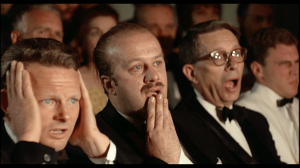 Commercial and BBC have very different sounds. Both Radio 4 and 5 are very produced and journalistically full of integrity. That’s not to say the commercial stations’ journalistic ethos are lacking at all but the style is markedly different, designed to provoke a reaction.
Commercial and BBC have very different sounds. Both Radio 4 and 5 are very produced and journalistically full of integrity. That’s not to say the commercial stations’ journalistic ethos are lacking at all but the style is markedly different, designed to provoke a reaction.
I can’t say I’ve ever been much of a talk radio fan, particularly antagonistic phone-ins, but it’s a very lively and seemingly growing genre and I’m keen to learn as much about how it is done as I can.
Blog post #2
With nearly thirty of us signed up for the module we have been split into three groups for the remainder of the semester.
We are to produce a half hour ‘magazine’ style programme with various features including an interview, a phoner, a ‘two way’, a package etc.
I’m in group C, a great bunch which includes some of the team with which I was lucky enough to have been put for last semester’s Music Radio module.
We had a few hours this afternoon to come up with various treatments to some of the stories on Burley. To be honest it was a little chaotic but fun nevertheless.
Throughout the afternoon we recorded the introduction/cue to some of the stories with a hint to the treatment that we thought best suited them.
We also started to sort out which roles we were going to fill.
I seem to be one of the two presenters which is pretty nerve-racking even though I’m fairly used to live radio. However the live radio I’m experienced in always had the cushion of recorded music to turn to if anything went awry. Talk Radio is a different creature altogether.
They say you never learn anything if you stay within your comfort zone, so discomfort, here I come!
Blog post #3
This week’s session was mostly theory but we had an excellent guest speaker from Radio 4’s Today. David McMullan who is a senior journalist and sometimes editor of the programme.
He gave us some great insights into how a fast paced current affairs magazine programme is put together on the BBC which was both revealing and a little terrifying.
It turned out we had met before though a mutual friend who works at Heart in Birmingham so we had a bit of a catch up and a gossip about the state of radio in the UK during the lunch break.
We have already listened to a variety of speech radio programmes from as broad a canvass as the aforementioned Today Programme through to Talk Sport and Radio 5 Live and it is becoming apparent that there is quite a difference in style between the BBC’s speech output and that of the commercial sector.
The BBC are very good at the serious news stuff but their phone-in style is very stilted compared to the likes of LBC and TalkSport.
Blog post #4
This week was much more doing than last week and took me so far out of my comfort zone.
We started by taking about a couple of programmes we had listened to: Radio 1’s The Surgery and The Sports Bar with Andy Goldstein on TalkSport.
The general opinion was that The Surgery was poorly produced and sounded like more of a box ticking exercise than a programme the network actually wanted to put any effort into.
However many of us enjoyed The Sports Bar despite not particularly being sports fans. Andy Goldstein made me feel comfortable as a listener because he sounded knowledgeable and in charge.
Aside form the ‘pub bore’ aspect of callers taking about Arsenal’s poor performance and ranting that if they replaced Arsene Wenger they would have won bla bla bla… it was quite entertaining.
The ‘doing’ part of the day involved producing a 15 minute demo magazine programme using the biggest stories of the day.
We have been given our audience demographic and region. Our audience are of evenly mixed gender aged between 16 and 42, which is which a large age range. We are London centric. I suggested to David Spencer that sounded like the old GLR (A previous incarnation of the BBC’s London local station). Then we both reminisced about the time that the BBC London local station was good.
I decided not to be the presenter in this instance but to work on a story about how uneventful the pervious night’s BRITs were. In the end we dropped the piece because it wasn’t fresh enough by the middle of the afternoon.
Instead I tried to write some London headlines, but aside from Storm Doris it was a pretty quiet news day. David helped me find one more decent London story so I produced a script and recorded a voice piece.
As the afternoon wore on I realised I wasn’t at all comfortable with Burli and couldn’t remember how to use it for the life of me. Fortunately everyone else in our group seems to have grasped it completely.
I decided to select the Talk Radio module precisely because I wasn’t comfortable with either news gathering, speech radio, without music, and Burli.
I must admit I am becoming increasingly anxious about it. Thankfully the rest of group C are more confident. I just hope I don’t let them down.
Blog post #5
It was an interesting and valuable exercise to listen back to our attempts at a 15 minute magazine programme at the end of last week’s session.
We are gradually learning to move away from a pure news bulletin towards a looser programme based on recent events.
Most of today was taken up covering the legal and compliance considerations. It’s a bit of a dry pic but David illustrated why it was so important with some illuminating examples.

I’m quite glad I’m not studying journalism, I fear I’d be too scared to run any story for fear of getting myself, or whichever media outlet I was working for, into trouble with the courts or a litigious individual.
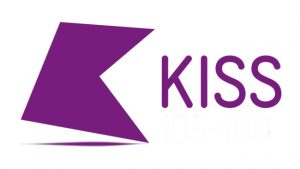 I was lucky to attend a training day at the Radio Centre with the Gaydar Radio crew and the Kiss breakfast presenters a few years ago so today was more of a refresher course.
I was lucky to attend a training day at the Radio Centre with the Gaydar Radio crew and the Kiss breakfast presenters a few years ago so today was more of a refresher course.
Blog post #6
David arranged for one of his work colleagues from Talk Sport, Sal Ahmed, to come in to give us some insights into being a talk radio producer.
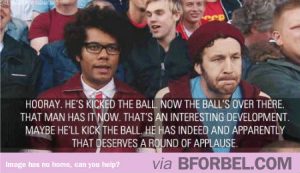 He was in the middle of planning a big forthcoming OB where a week of programmes was coming live from a football match / tournament somewhere in Europe.
He was in the middle of planning a big forthcoming OB where a week of programmes was coming live from a football match / tournament somewhere in Europe.
Sal also let us into what it was like to produce big names and how to get the best out of people who weren’t all that used to broadcasting but knew their subject.
We spent the afternoon looking for stories on which we could base items in our ‘magazine’ show on and trying to work out what the best treatment for each story was.
We have to include a package, an interview (pre-recorded or live), a two-way, some audience interaction (albeit faked) and a studio discussion amongst other things.
We also finalised roles with the help of David and were able to have short tutorials to make sure we were all comfortable with what needs to be done.
Blog post #7
With David working away this week Matthew stepped in to help move things along. The morning was spent going over the essay questions.
 I’m pretty sure which question I’m going for and I’ve started to do some research on it already.
I’m pretty sure which question I’m going for and I’ve started to do some research on it already.
We were give time after lunch to consolidate sone of our story ideas before meeting with Mathew to get some feedback on the suitability of the stories and which treatment best suited them. It was very helpful to get the benefit of Mathew’s experience.
It appears that the core of group C has formed and is working well was a team. It is unfortunate, however, that not all of group C is either willing or able to become part of that core.
Blog post #8
This week David was back, and following the attack in London the previous day, he set us the task of putting together a live 15 minutes news programme, which had to include an outside broadcast element from as near to Westminster Bridge as our OB team could get.
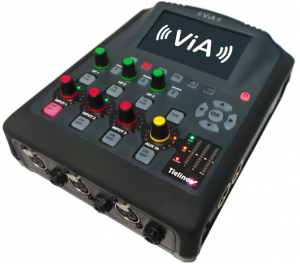 All the OB crews from the three groups set off with the TieLine equipment to set up, while the rest of us used the Burli software, and other sources, to build different angles on the terrorist sorry. We were allowed to use audio, not only obtained from Burli but also from anywhere else on the net we chose.
All the OB crews from the three groups set off with the TieLine equipment to set up, while the rest of us used the Burli software, and other sources, to build different angles on the terrorist sorry. We were allowed to use audio, not only obtained from Burli but also from anywhere else on the net we chose.
The team pulled together well and we eventually produced a 13 minute programme which contained a few different angles on the story and an interview live from our reporter on the scene… well not our reporter, someone else’s reporter, but nevertheless it was a very useful exercise.
I anchored the programme from the studio which went surprisingly smoothly as I’m more used to talking off-the-cuff than from scripts. I was happy to be able to do some editing on the script before we went on air, to both make sure I was familiar with what I had to say and rewrite some sections, so it sounded more like I was saying them in my voice.
Overall I think we did a reasonable job, although David hasn’t gone through them with us as yet, so I could be severely deluded!
Blog post #9
Lucy (our editor) called a meeting after our lecture and seminars for Tuesday, our first meeting outside of the timetable scheduled Thursday slot for the Talk Radio module.
Most attended, which was encouraging, and Lucy asked for a progress reports on how everyone was doing with their assigned stories. Most are still in their infancy it has to be said, but hopefully they will come together in the end.
Lucy affirmed that she would like a good percentage of the packages and interviews recorded before next week’s fist pilot programme.
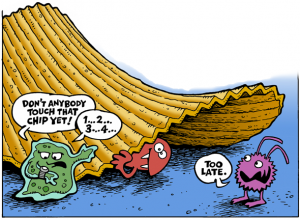 I have been tasked with writing the interview about the 5 second rule, finding an interviewee and recording said interview. I am also in charge of producing a vox pop item on the subject.
I have been tasked with writing the interview about the 5 second rule, finding an interviewee and recording said interview. I am also in charge of producing a vox pop item on the subject.
So far I have made appeals on social media to ask if I know anyone, or anyone I know knows anyone, who is somewhat of an expert on food hygiene. Thus far I have had only one reply to my appeal which isn’t terrible encouraging.
I did contact the Food Standards Agency via their press office. They replied almost immediately, which was impressive. Unfortunately they said they “do not have the resources to front anyone for this interview”. Nevertheless they did provide me with a very useful link.
I must confess I’m reluctant to go out and record the vox pop section of the package unless and until I have an interview in the bag. Perhaps I should just get on with it while I’m waiting for a suitable interview candidate to emerge.
I’m even considering emailing the university professor quoted in the article. Perhaps I should just go for it. At worst he can only say no.
Blog post #10
 Vox pop’s for the 5 second rule item recorded at Borough Market. I’ve hear people have been told off for trying to record interviews at Borough Market so I was lucky no-one either noticed or no-one minded much. Apparently it’s private property. I’ve not yet attempted to edit the recording but I’m reasonably confident I have a reasonably interesting range of opinions and voices.
Vox pop’s for the 5 second rule item recorded at Borough Market. I’ve hear people have been told off for trying to record interviews at Borough Market so I was lucky no-one either noticed or no-one minded much. Apparently it’s private property. I’ve not yet attempted to edit the recording but I’m reasonably confident I have a reasonably interesting range of opinions and voices.
Today we attempted to put together a pre-pilot edition of our programme. Although we have little or no audio ready we mocked up a few of the interviews and packages and attempted another OB.
Sadly due to problems with the TieLine equipment we were unable to practise our OB today so we had to make do with a phone call. Not idea and really quite frustrating.
We were, however, able to produce a half hour show, which although had it’s problems was quite good fun to do. We learned a lot.
This evening I’ve have spend a couple of hours trying to secure an interviewee for our mini feature on Hollywood remakes. So far I’ve emailed three potential leads. Fingers crossed.
Talking of contacting potential interviewees, I did pluck out the courage to contact Professor quoted in the ‘5 seconds rule’ articles and low and behold he said he’d be happy to be interviewed, this is great news.
We have agreed that I can FaceTimeAudio call him on Wednesday morning at 10am. As the pilot show is the following day it’s cutting it a little fine, but fingers are well and truly crossed.
Blog post #11
After my appeal on Facebook and Twitter, for anyone who knew enough about films to be interviewed for our Hollywood remakes feature, I was amazed at the response. In the end I booked a chap called Mark Searby who’s a film reviewer and journalist for Anglian Radio and the Screenjabber website. I passed his details on to Abbi who contacted him and they arranged to meet up.
I had several other replies from some very credible candidates so I’ve politely asked them all to stand by just in case we need them. They have all agreed to do so.
My interview with Professor Hilton, who did the recent 5 second rule research, was moved from 10am to 9pm so I had had to get up nice and early to make sure I didn’t sound too rough on the recording.
 In the end it went well despite having to connect via FaceTimeVideo rather than just FaceTimeAudio. We couldn’t quite work out why FaceTime insisted on connecting the video but after a couple of attempts I decided to let it be. FaceTime certainly sounds better then a phone call although it is quite dependent on the reliability of the wifi. Mine was great, his, at Aston University, wasn’t a tad sporadic.
In the end it went well despite having to connect via FaceTimeVideo rather than just FaceTimeAudio. We couldn’t quite work out why FaceTime insisted on connecting the video but after a couple of attempts I decided to let it be. FaceTime certainly sounds better then a phone call although it is quite dependent on the reliability of the wifi. Mine was great, his, at Aston University, wasn’t a tad sporadic.
Professor Hilton was a great interviewee and was quite chatty so I recorded over 9 minutes of material which took quite a bit of editing. Nevertheless it is better to have too much to edit down than to have a sparse interview and try to eek it out.
While I was editing it down I did notice an occasional glitch in the sound which I hadn’t noticed while transcribing the interview. I suppose It became more apparent because the noises appear close together post edit. After a couple of hours and some very testing edits I reduced it to the information I wanted which took it to 3 and a half minutes, spot on!
As soon as I had completed the edit and saved and exported the file I contacted my three standby contributors to thank them for offering to take part and to stand them down. I asked all of them if I may keep their details on file just in case I needed to interview a film journalist in the future, they all graciously agreed.
Blog post #12
It appears we have having quite a lot of trouble securing a psychologist for our piece on exam stress. Out of all the possible candidates none are available.
It occurred to me that our University offers a BSc in psychology so I took a look on the website to see if I could find a suitable lecturer who may wish to take part.
One of the other students on my LGBTQ Studies module is majoring in psychology so I asked her if she could recommend any of her teaches. She immediately suggested Nina Smyth who happens to be a stress specialist.
I looked up her contact details and once I’d found them I posted them in our group’s Facebook messenger chat along with a suggestion that she may be an ideal person to contact. Fingers crossed that she is willing and able to take part.
Blog post #13
Hmmm, blog post number 13, unlucky for some. As this post is about the day of our pilot show the number 13 seems quite appropriate.
We were three items short at the start of the day so we decided to include a piece on a story that was developing about a father who had refused to pay a fine levied on him for taking his daughter on holiday during term time.
Other bits of audio were ready to go, but cues hadn’t been written so I asked everyone to have cues for their pieces written as soon as possible so I could go through them all and rewrite them, if needed, in my own voice. The Secrets of Westminster tour was in the can but had not yet been edited so that was another task which needed to be completed.

When David Spencer demonstrates how to write a good cue it all seems so simple, but as soon as I start trying to recreate the ease with which he composes them I flounder almost immediately. It seems I can pass David’s wisdom on to others but have trouble actioning it myself. Writing cues is a real art!
Although we were last to broadcast our pilot, and therefore had the longest amount of time to put it together on the day, we still struggled.
We knew we were short on length even as we went into the studio to set levels. Matt managed to finish the edit on the Westminster tour audio in time but there wasn’t a great deal of time left to write a good cue.
It felt like all the cues were rushed to be honest, but it’s something I’m just going have to get my head around a learn how to do quickly and considerably better than I do now.
Abbi and I were quite please with what we’d come up with as a two way to go into her interview with the film expert. It was about the only one that I thought was quite conversational.
We went to air on time but knowing we were already 3 minutes short of material for a 30 minute show.
Blog post #14
The pilot programme.
There was a problem with the TieLine again, we don’t seem to have much luck with it. The problem meant that the part of the introduction where I brought in my co-presenter live from ‘Somewhere in London’ had to be dropped. This had a knock on effect on my confidence. It shouldn’t have had, but it did.
I knew as we were doing the show it sounded as though it had been put together hastily. There was no specific item that didn’t work but it all felt a little out of control, and not in a good way.
There were further problems with the TieLine, and because I could see the efforts they were making the control room to sort out the situation, my attention was drawn away from my job of presenting.
The new story about the father refusing to pay the fine for taking his daughter on holiday wasn’t really a finished piece, but we put it first in the running order and presented it as a two way between myself and Abbi. It wasn’t terrible in itself, but the fact that the next item about Hollywood remakes also started as a two way made the beginning of the programme sound a bit messy.
Suffice to say the rest of the programme didn’t really flow terribly well and as a presenter I was pretty ropey. Knowing we didn’t have enough material in the back of my mind play on my concentration and then when I was told the OB had been abandoned and now it was just going to be a phone call I knew we’d produced a turkey.
David made some positive comments but didn’t pull his punches about the rest of it. We need to seriously up our game for next weeks actual broadcast and I particularly need to concentrate on what my job is and let everyone else concentrate on theirs.
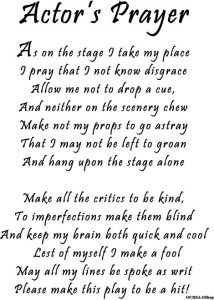 As soon as I got home, and while David’s comments were fresh in my mind, I went through all the cues and started the rewrites. It took me three hours but I have them in much better shape now.
As soon as I got home, and while David’s comments were fresh in my mind, I went through all the cues and started the rewrites. It took me three hours but I have them in much better shape now.
I shall walk away from them for a couple of days and then revisit them with fresh eyes and see if they need further changes.
Hopefully the outstanding packages can be produced in good time so I can have plenty of opportunity to redraft the cues that come along with them.
After a pretty grotty night’s sleep I don’t feel too despondent this morning. As we say in the theatre, if the dress rehearsal is a bit of a shambles the first night usually goes like a dream. Here’s hoping the same rules of nature apply to producing magazine radio programme.
Appendix to post #14
There’s a breaking news story that Dame Margaret Hodge’s report into the garden bridge says it should be scrapped and the resultant loss of money should be swallowed.
I’ve just posted this in the Messenger chat:
“The OB should now be… “Last week Dame Margaret Hodge’s review of the Garden Bridge said it would be better to accept the loss of scrapping the whole project. We’re on the site of the proposed bridge to get reactions to her report. I’m joined by… ” etc. Then we can get some public opinions as well as the protesters. Could be a really good OB.
Blog post #15
It’s two days until the live programme is produced and most of us gathered in the Radio Department to work on various aspects of the programme.
I’m sorry to report that not much progress had been made on the outstanding items at the beginning of the day, so we really weren’t much further on than we were at the close of play on Thursday, after the pilot programme.
It was interesting to look at my script and cue rewrites for the first time since I did then as soon as I got home from the pilot. Aside from a few tweaks they have remained pretty much what I changed them to on Thursday evening.
Abbi and I did spend quite a lot of time rewriting the Hollywood remake two way. We spoke it out loud with each other a number of times, making small changes avery time and I’m confident that it is now considerably better than it was.
Clare and I went into the studios to practise tightening up the technical side of things. I wanted to have as much time in the booth as possible in order to become more comfortable with my surroundings and Clare wanted to be sure that she was as confident as she could be tech-oping from the studio. It was a very worthwhile exercise, as we made some changes to beds and stings, and the whole flow of the programme should be much tighter now.
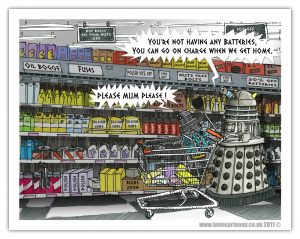 Despite my suggestions, no progress has been made in tracking down a psychologist for the exam stress package / discussion / phone-in. I’m afraid that there seems to be a reticence when it comes to picking up the phone and just calling people.
Despite my suggestions, no progress has been made in tracking down a psychologist for the exam stress package / discussion / phone-in. I’m afraid that there seems to be a reticence when it comes to picking up the phone and just calling people.
The value of pester power is underrated when trying to secure guests or contributors to a programme. Sending an email is a great way to get in contact with someone initially but the email must be followed up with phone call if no reply is achieved. After all, they can only say no and when you have a definitive answer either way you can make progress. Simply hoping the right candidate will get back to you with a promise to take part is not an option that will bring you much success in the real world.
By the end of the day some of the suggested reworking of some of the pre-recs were done which was encouraging, and the raw audio for one of the outstanding packages was in the can.
I’m hopeful that we will end up with more material than we need and will have to drop something on the day. I’d rather have too much and have to cut than have insufficient and have to fill.
Finally, I have decided to stop trying to be a different presenter than I naturally am and stick to what I’m good at. I will really familiarise myself with all the script links and cues before Thursday so I pretty much know what I’m saying without having to read them. I need to be more relaxed and naturalistic.
Blog post #16: The show.
The old adage would appear to be true then. If the dress rehearsal is not good at all, the opening night will be a roaring success.
It is with such relief I can report that our live Talk Radio magazine programme was a considerable improvement on the pilot episode of last week.
We had an outside broadcast, with a live guest, and we had a live guest in the studio. We had so many items ready to go that we had to drop one. Lucy (Editor) was very decisive and cut what needed to be cut without ruffling any feathers. The item about exam stress never really got off the ground and was finally put to bed 5 hours before we went on air. Also the Globe Theatre item, which then evolved into an attempt to encourage young people to get into the arts, was dropped with only a few hours to go. It was, however, held in reserve just in case the OB didn’t pan out or our studio guest failed to materialise.
I was fortunate in that I had plenty of time to rewrite many of the cues, so I was able to fine tune them and was helped in doing so by the fresh eyes of Molly. It important to have someone else cast their peepers over something you’ve been working on alone for a while. Sometimes you can’t see the wood for the trees.
David brought in a colleague from BFBS, John , who was tasked with offing any help he could to us all and I must say his input was invaluable, as was his encouragement.
I think my performance was a considerable improvement on the week before’s effort but it’s not really for me to judge. My decision to concentrate on my task rather then involving myself with what was going on in the control room was a wise one. I’m not entirely comfortable with leaving the knob twiddling to anyone else yet, but I realise that it has the potential to make me a better presenter if I can concentrate on just doing the talking. Technically Clare did a great job and I had full confidence in her abilities which certainly helped.
 Our studio guest was running late so, while we were on air, the decision was made to move her interview to the end of the programme. In the end the rescheduled line up worked beautifully leaving 5 minutes for the interview which I managed to rap up exactly on time to leave enough room to squeeze in a few tweets and to say our goodbyes before the outdo ident played, which we hit spot on. Very satisfying indeed.
Our studio guest was running late so, while we were on air, the decision was made to move her interview to the end of the programme. In the end the rescheduled line up worked beautifully leaving 5 minutes for the interview which I managed to rap up exactly on time to leave enough room to squeeze in a few tweets and to say our goodbyes before the outdo ident played, which we hit spot on. Very satisfying indeed.
In the end the whole team was vey present on the day and I felt like the team gelled when it really mattered. Those not in the studio or control room listened intently, willing it to go well which was lovely.
I learned a great deal from this module and I am no longer frightened of talk radio or scripts, which was the whole point in selecting the module. You never have the chance to improve your skills base of you never look beyond your comfort zone.